#cryptonomicon
Text
T. E. Lawrence Pritchard Waterhouse
7 notes
·
View notes
Text
You'll find the other polls in my 'sf polls' tag / my pinned post.
That'll be it for me + SF for today but who knows about tomorrow ? If you want to make suggestions for other polls, please do.
#polls#science fiction#sf polls#a scanner darkly#philip k. dick#the demolished man#alfred bester#dhalgren#samuel r. delany#samuel delany#cryptonomicon#neal stephenson#the day of the triffids#john wyndham#roadside picnic#arkady strugatsky#boris strugatsky#stand on zanzibar#john brunner#downbelow station#c.j. cherryh#the lady astronaut of mars#mary robinette kowal
26 notes
·
View notes
Text
Intrusion Countermeasures (“Ice”) from Virtual Realities for Shadowrun (1st Edition). White IC. Part 6
Black ice may have killed Cliff Burton.

1962-1986. May he rock in peace.
While virtual reality is still struggling to become a thing (looking at you, Metaverse), ICE remains firmly in the realm of science fiction. Short for Intrusion Countermeasures Electronics, the term was popularized in the cyberpunk fiction of William Gibson, though not developed deeply, primarily focusing on ICE that can kill the user (“Black ice”) and programs that can defeat ICE (“Icebreakers”).

“Oh, I thought you meant... Okay. I’ll turn the ship around.”
For Shadowrun, the “E��� was dropped, as IC is a form of software, not hardware, and the types were expanded from the original “black”, embracing traditional Black and White Dualism along with Shades of Gray.
White IC are passive and cannot damage your persona. Gray IC can damage your persona, and mess with your programs and deck. Black IC just frags you, the decker, up. Just as you, the decker, are running a program (persona) on someone else’s computer system, all IC are independent programs that can be crashed in cybercombat (using the combat utilities Attack and Slow). However, as it is in meatspace, it shall be in cyberspace -- you should try to be sneaky first before busting out the big guns.
The core book had three types of white IC. :
Access
The most common form, this is just the logon box where you enter your username and password. Can be bypassed either with Deception (fake credentials) or Sleaze (sneak past it).
Barrier
No chance to enter a password, just blocks access.

Must Sleaze.
Scramble
Both this IC, and the decker program to counter it (Decrypt), are meant to represent implementations of cryptography and cryptanalysis, which, having read Cryptonomicon at least a dozen times, makes me an expert.
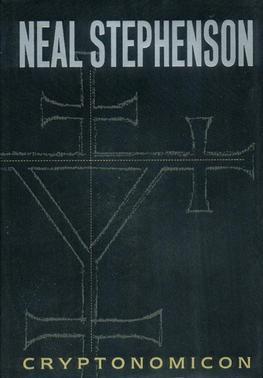
Scramble can also be defeated using Deception, which means why would you ever need a Decrypt program? Unless you plan to use Sleaze instead of Deception, in which case you could use Decrypt. But since Barrier can only be defeated by Sleaze, deckers always used it. Though, of the book archetypes, the Decker doesn’t have Sleaze, while the Elven Decker does.
Virtual Realities adds one new type of White IC:
Probe
This is Access IC that is specifically resistant to the Sleaze program, because Frag You, players, and your most useful way of sneaking around the Matrix. If Access is like the logon, Probe is like a Captcha. But, you know, Shadowrun style.

#shadowrun#matrix#metaverse#queensryche#cryptonomicon#neal stephenson#ice#metallica#cliff burton#william gibson
8 notes
·
View notes
Text
“In the long run, it may, or may not, be a good idea for the Sultanate of Kinakuta to have a gigantic earthquake-, volcano-, tsunami-, and thermonuclear-weapon-proof Ministry of Information with a cavernous sub-sub-basement crammed with high-powered computers and data switches. But the sultan has decided that it would be sort of cool. He has hired some alarming Germans to design it, and Goto Engineering to build it. No one, of course, is more familiar with staggering natural disasters than the Nipponese, with the possible exception of some peoples who are now extinct and therefore unable to bid on jobs like this.”
— Cryptonomicon by Neal Stephenson
3 notes
·
View notes
Text
If I had a nickel for every time I encountered a piece of fiction about cryptography in which everything was tied to a cryptocurrency of some sort and to a big sum of money, I would have two nickels. That's not a lot, but it's funny that it happened twice.
1 note
·
View note
Text
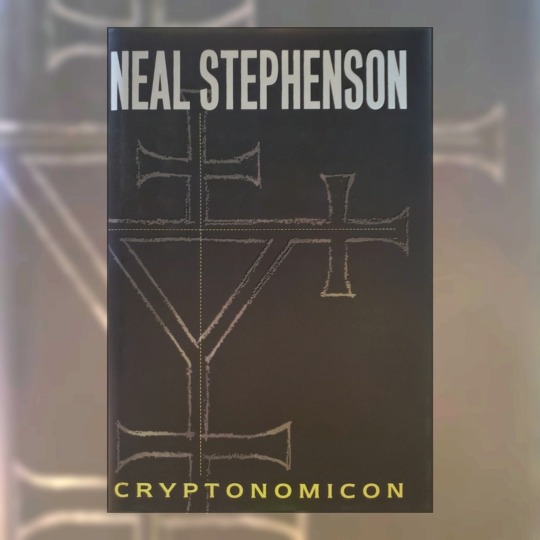
2/27/24 — Open 6-9p. Mask recommended. No open drinks, please.
I've wanted to read this guy's books since they were new. Sadly, I haven't much time to read. They're on my endless TBR. The last books I read were in Dec. '19, bus-bound due to major car work. "A Princess of Mars" & "Treasure Island" got me through. I really want to keep this 1st/1st gem, but it's not to be.
#BonnettsBooks#DaytonOhio#BrickAndMortar#UsedBookStore#NealStephenson#Cryptonomicon#BookSellerLife#daytonoh#dayton
1 note
·
View note
Text
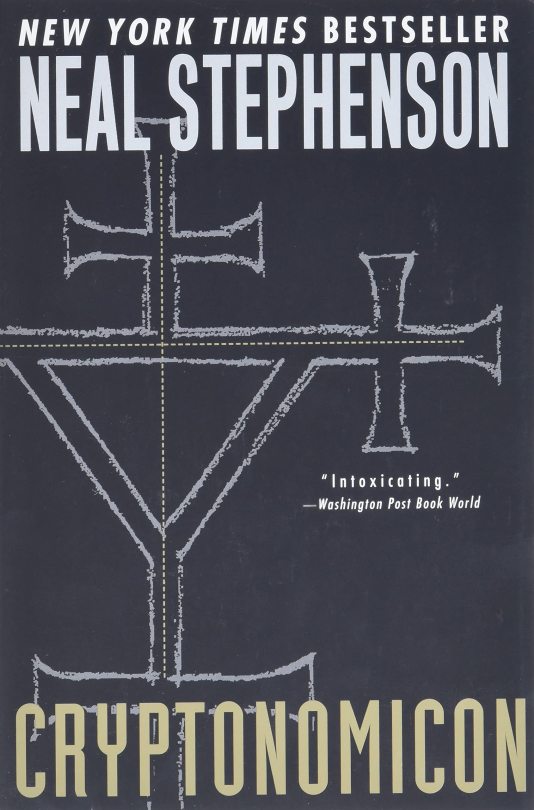
Title: Cryptonomicon | Author: Neal Stephenson | Publisher: Avon (2002)
1 note
·
View note
Text
Re-Reading Cryptonomicon
Last year I had a few posts I was working on around my eighth Cryptonomicon re-read that never really came together; they’ve been sitting in my drafts gathering dust for quick a while now. At the time I had this strange belief that a weekly post on what I’d been reading was at all a feasible thing to take on; you can find the first entry in that supposed habit here. But anyways, Cryptonomicon.
My thoughts on this book, and Neal Stephenson as a whole, are complex. On the one hand, there’s aspects of his books and characters that evoke a particular kind of male nerd perspective that I find quite grating. Being a male nerd myself, I’ve met quite a few people who think and act this way and they’re often, in a quite earnest way, awful to be around. Unconscious misogyny, unexamined bias… the whole nine yards with a strong dose of intellectual superiority thrown in to boot.
But at the same time, he’s an incredible writer. Enormous amounts of research, fantastic turns of phrase, and a good amount of humor thrown in. I’ve bounced off a few of his more cerebral books (Anathem comes to mind and Seveneves wasn’t a whole lot better for me) but Snow Crash, Reamde, and Cryptonomicon are some of my favorite books.
And there’s echoes of myself that I can see in his characters, particularly the ‘smart but detached from reality’ sort. Sometimes Stephenson will say something like this and I could swear he was talking about me:
“… but Waterhouse’s conversation doesn’t go anywhere in particular. He speaks, not as a way of telling you a bunch of stuff he’s already figured out, but as a way of making up a bunch of new shit as he goes along. And he always seems to be hoping that you’ll join in.” (Cryptonomicon)
Or:
“An idea springs out of his forehead fully formed, with no warning. This is how all the best ideas arrive. Ideas that he patiently cultivates from tiny seeds always fail to germinate or else grow up into monstrosities. Good ideas are just there all of a sudden, like angels in the Bible. You cannot ignore them just because they are ridiculous.” (Cryptonomicon)
Or:
“His feeling of disappointment that accompanies this action has nothing to do with the contents of the safe. He is disappointed because he has solved the problem, and has gone back to the baseline state of boredom and low-level irritation that always comes over him when he’s not doing something that inherently needs to be done, like picking a lock or breaking a code.” (Cryptonomicon)
That sense of recognition in these characters is probably a big part of why I keep coming back, and why I’ve read Cryptonomicon eight times. It doesn’t hurt that Stephenson is very aware of the aforementioned male nerd tendencies and tends to call them out actively in his own characters, reducing that pain a fair bit.
This time around I also took advantage of some extras in my eBook copy and read the entirety of Neal Stephenson’s 1996 article “Mother Earth Mother Board” about the laying of the then-longest wire on Earth. Thankfully it has not succumbed to link rot.
It’s a monster of an article, clocking in at over 40K words (essentially the length of a short novel) and it’s a fascinating insight into everything from the history of submarine cable-laying to the technology involved and the political battles at play. It’s the kind of thing I’ll probably need to read a few times before I fully grasp everything it contains, which is fairly typical of the things Neal Stephenson writes.
Anyways, now that I’ve got this out in the world I can finally clear out that drafts folder. A good feeling all around.
1 note
·
View note
Text

Ok guys but what better place to read Cryptonomicon than on an actual class A submarine
0 notes
Text
“An idea springs out of his forehead fully formed, with no warning. This is how all the best ideas arrive.” ― Neal Stephenson, Cryptonomicon
0 notes
Text
been returning to my roots and reading dcwt properly all the way through for the first time since starting grad school (probs since like 2018 idk) and like wow!! it is so cool to actually understand almost every piece of jargon without looking up a single thing. this is WAY more satisfying than completing my stupid bachelors degree via zoom. id love to examine how much this fic impacted my study decisions over the years but also i feel too biased as an inside observer. i hope cleanwhiteroom knows they are (at least 40% of) the reason at least one person attended science grad school.
#dcwt#i know i said i was gonna read it sometime last year but i didnt actually#anyway also the audio version is so good im LOVING it#i needed this wake up call ive just been reminded i LOVE TO LEARN#physics math and neuroscience for the WIN#also philosophy but like i am no expert on that#i feel like this is the year i start in on CWR's stargate works#omg this is the first time ive read DCWT since I read cryptonomicon#that i know for sure#bless up#anyway live love laugh everybody ive gotta write some bs about neural nets#thank the laurd
8 notes
·
View notes
Text
I've been slacking in my livetumbling of books but I have to put it down for the record: I want the ten minutes of my life that I spent reading about how Randy likes to eat his Cap'n Crunch back
9 notes
·
View notes
Text
alan mathison turing <3
4 notes
·
View notes
Text
Connections between Gods of Stories: Science-Fiction, and Magic being a Powerful Lie - Approaches to Storytelling
From "Loki God of Stories - A Comparison between MCU and Comics" series - Co-Written by @lucianalight (Luci) and @theitcharchives (Hollow)
“All science is fiction until it’s fact.” The line said by Timely implies that in Loki’s series, fiction is closer to science than one would think.
In S02E05, Ouroboros is a scientist and a writer. We are introduced to the concepts of What and How, aka science’s staples, then When and Why, aka science-fiction’s staples.
And the Where, though unmentioned–the original people present had to be reunited together to recreate an aura and pinpoint a location in time and space: Where became a staple of science-fiction.
Now, the Who seems to be about “the people he cares about/wanted to see”. (It is said in The Making of Loki -Luci). Yeah it stands as the theory behind the practice, but I have a headcanon: it is my (=Hollow’s) personal understanding and belief that the Who is essential to magic–once Loki understood the Who, he understood his role. He could control the time slips because he wanted to protect those he cared about and their lives. He would have to sustain the timelines because he wanted to find a solution to the dilemma and thus he broke and substituted the equation. Magic needs a who, a will to direct it to not just be aimless energy, and Loki made his choice to use his own and his power to allow everyone else to make their own choices. “Who he wanted to protect” is not the relevant part, “who wants to do the protecting” is.
These six elements are not only the fundamentals of journalist articles, but also of stories. You kind of have to answer them to have a plot–or at least it’s a good start.
In S02E06 Loki spends centuries learning what OB knows, which leads Loki to learning how to stop time with his magic. Something HWR can do with technology, Loki substitutes with magic.
Then, in Thor 2011, Thor says in Asgard magic is considered to be a science. So for MCU Loki, magic is a science.
In MCU Loki’s universe, science, fiction and magic all cover roles that combine into answering all questions for one goal: tell a story. So Loki, who is a master of magic (Who), and thus also a scientist (What, How), can cover the remaining elements (Where, When and Why) because he wants to rewrite the story–he wants to exercise his will over his fate.
In Loki’s series, if you are a magician you are a scientist, and science deals with facts. Magical facts then are still facts, and if you can write with magic, you can change reality. Even stop time and jump across it–because you want to, and you are a master scientist in the branches of mischief and chaos.
Comics Loki says “So let’s talk about magic. [*...] At the core [...] magic is taking a thought and making it real. Taking a lie and making it the truth. Telling a story to the universe so utterly, cosmically perfect that for a single, shining moment… the world believes a man can fly.” (-Loki; Agent of Asgard #1) “What is a lie, Verity? A lie is a story told. That’s all. And we can rewrite our stories. All of us. Write our own happy endings. Our own redefinitions. We don’t have to be what we’re told to be. Even by ourselves.” (-Loki: Agent of Asgard #13)
Comics Loki is the God of Lies. MCU Loki, not so much–he’s never quite had the opportunity to be a god of lies. He’s called the God of Mischief, and he does Mischief aplenty. Comics Loki’s journey to becoming God of Stories went through understanding that his propensity for crafting lies was just exercise for learning to craft stories. With lies, comics Loki does magic. He is not quite a scientist–comics never really gave the vibe magic=science. Magic is magic and works more on possibilities and potentials than facts, has its own rules (* “We can dicker on the exact rules, if you like. There are all sorts of grimoires and cryptonomicons. I’ve got an AD&D manual somewhere” -Loki: Agent of Asgard #1 - Loki’s mention of Dungeons and Dragons manuals delightfully suggests that, one: it exists in E-616 and he plays it, two: that one could actually do magic while playing it, and three: something poetic about writing and creating magic and playing pretend and the power of imagination).
Well the point of all this is–both MCU Loki and Comics Loki deal with storytelling in their own way. Comics Loki has a true magician approach to it. He writes and rewrites stories because it is his potential blooming and flourishing. MCU Loki has a near-scientific approach, that still beautifully flows into magic, and is quite flattering to Loki–he rewrites the story and holds Yggdrasil because he is Loki and he wants to, and he can. Because “we are gods” babey.
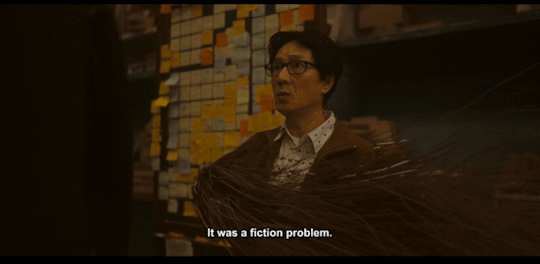

Previous - Next
28 notes
·
View notes
Text
Bruce Schneier's "A Hacker's Mind"
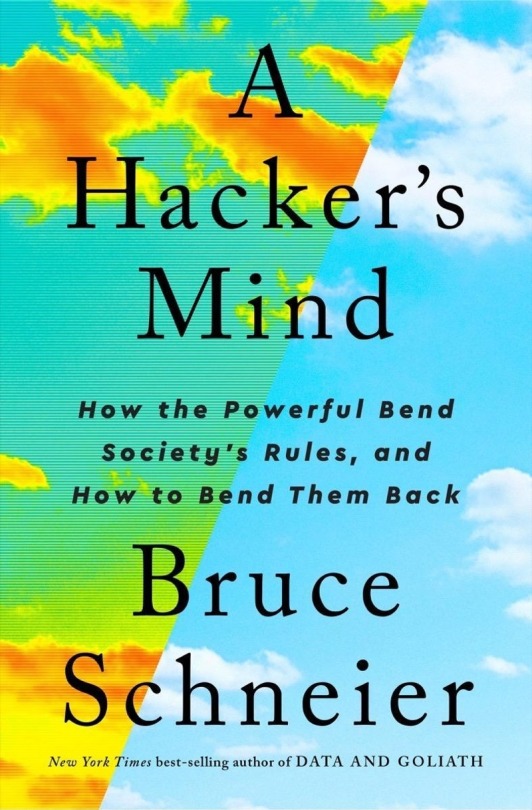
A Hacker’s Mind is security expert Bruce Schneier’s latest book, released today. For long-time readers of Schneier, the subject matter will be familiar, but this iteration of Schneier’s core security literacy curriculum has an important new gloss: power.
https://wwnorton.com/books/9780393866667
If you’d like an essay-formatted version of this post to read or share, here’s a link to it on pluralistic.net, my surveillance-free, ad-free, tracker-free blog:
https://pluralistic.net/2023/02/07/trickster-makes-the-world/#power-play
Schneier started out as a cryptographer, author of 1994’s Applied Cryptography, one of the standard texts on the subject. He created and co-created several important ciphers, and started two successful security startups that were sold onto larger firms. Many readers outside of cryptography circles became familiar with Schneier through his contribution to Neal Stephenson’s Cryptonomicon, and he is well-known in science fiction circles (he even received a Hugo nomination for editing the restaurant guide for MiniCon 34 in 1999).
https://www.schneier.com/wp-content/uploads/2016/02/restaurants-san-jose.pdf
But Schneier’s biggest claim in fame is as a science communicator, specifically in the domain of security. In the wake of the 9/11 bombings and the creation of a suite of hasty, ill-considered “security” measures, Schneier coined the term “security theater” to describe a certain kind of wasteful, harmful, pointless exercise, like forcing travelers to take off their shoes to board an airplane.
Schneier led the charge for a kind of sensible, reasonable thinking about security, using a mix of tactics to shift the discourse on the subject: debating TSA boss Kip Hawley, traveling with reporters through airport checkpoints while narrating countermeasures to defeat every single post-9/11 measure, and holding annual “movie-plot threat” competitions:
https://www.schneier.com/tag/movie-plot-threat-contests/
Most importantly, though, Schneier wrote long-form books that set out the case for sound security reasoning, railing against security theater and calling for policies that would actually make our physical and digital world more secure — abolishing DRM, clearing legal barriers to vulnerability research and disclosure, and debunking security snake-oil, from “unbreakable proprietary ciphers” to “behavioral detection training” for TSA officers.
Schneier inspired much of my own interest in cryptography, and he went on to design my wedding rings, which are cipher wheels:
https://www.schneier.com/blog/archives/2008/09/contest_cory_do.html
And then he judged a public cipher-design contest, which Chris Smith won with “The Fidget Protocol”:
http://craphound.com/FidgetProtocol.zip
Schneier’s books — starting with 2000’s Secrets and Lies — follow a familiar, winning formula. Each one advances a long-form argument for better security reasoning, leavened with a series of utterly delightful examples of successful and hacks and counterhacks, in which clever people engage in duels of wits over the best way to protect some precious resource — or bypass that protection. There is an endless supply of these, and they are addictive, impossible to read without laughing and sharing them on. There’s something innately satisfying about reading about hacks and counterhacks — as authors have understood since Poe wrote “The Purloined Letter” in 1844.
A Hacker’s Mind picks up on this familiar formula, with a fresh set of winning security anaecdotes, both new and historical, and restates Schneier’s hypothesis about how we should think about security — but, as noted, Hacker’s Mind brings a new twist to the subject: power.
In this book, Schneier broadens his frame to consider all of society’s rules — its norms, laws and regulations — as a security system, and then considers all the efforts to change those rules through a security lens, framing everything from street protests to tax-cheating as “hacks.”
This is a great analytical tool, one that evolved out of Schneier’s work on security policy at the Harvard Kennedy School. By thinking of (say) tax law as a security system, we can analyze its vulnerabilities just as we would analyze the risks to, say, your Gmail account. The tax system can be hacked by lobbying for tax-code loopholes, or by discovering and exploiting accidental loopholes. It can be hacked by suborning IRS inspectors, or by suborning Congress to cut the budget for IRS inspectors. It can be hacked by winning court cases defending exotic interpretations of the tax code, or by lobbying Congress to retroactively legalize those interpretations before a judge can toss them out.
This analysis has a problem, though: the hacker in popular imagination is a trickster figure, an analog for Coyote or Anansi, outsmarting the powerful with wits and stealth and bravado. The delight we take in these stories comes from the way that hacking can upend power differentials, hoisting elites on their own petard. An Anansi story in which a billionaire hires a trickster god to evade consequences for maiming workers in his factory is a hell of a lot less satisfying than the traditional canon.
Schneier resolves this conundrum by parsing hacking through another dimension: power. A hack by the powerful against society — tax evasion, regulatory arbitrage, fraud, political corruption — is a hack, sure, but it’s a different kind of hack from the hacks we’ve delighted in since “The Purloined Letter.”
This leaves us with two categories: hacks by the powerful to increase their power; and hacks by everyone else to take power away from the powerful. These two categories have become modern motifs in other domains — think of comedians’ talk of “punching up vs punching down” or the critique of the idea of “anti-white racism.”
But while this tool is familiar, it takes on a new utility when used to understand the security dimensions of policy, law and norms. Schneier uses it to propose several concrete proposals for making our policy “more secure” — that is, less vulnerable to corruption that further entrenches the powerful.
That said, the book does more to explain the source of problems than to lay out a program for addressing them — a common problem with analytical books. That’s okay, of course — we can’t begin to improve our society until we agree on what’s wrong with it — but there is definitely more work to be done in converting these systemic analyses into systemic policies.
Next week (Feb 8-17), I'll be in Australia, touring my book Chokepoint Capitalism with my co-author, Rebecca Giblin. We'll be in Brisbane on Feb 8, and then we're doing a remote event for NZ on Feb 9. Next are Melbourne, Sydney and Canberra. I hope to see you!
https://chokepointcapitalism.com/
[Image ID: The WW Norton cover for Bruce Schneier's 'A Hacker's Mind.']
#pluralistic#schneier#bruce schneier#books#reviews#hacking#power#punching up#punching down#gift guide#tax evasion#regulatory capture
56 notes
·
View notes
Note
I’m not sure what to ask, because I’m awkward and crap, but I’d just like to tell you that your presence on my dash and in my notifs always makes me smile.
How about - please tell us a random fact about your oc, for example, what is their favourite book and why? It doesn’t have to be a book that appears in the game, I’ll leave that up to you.
squee! i got an ask. thank you! you are so sweet <3
favorite book: neal stephenson's cryptonomicon. it has everything she loves: military history, cyryptography, spies, and computer science. (FTR, it's prolly my least favorite stephenson book.)
6 notes
·
View notes